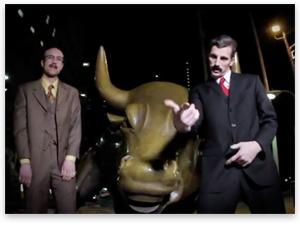Tuesday

Illusory Tuesday
"This afternoon on National Public Radio James Fallows proclaimed that 'there is essentially no disagreement whatsoever' among economists that more stimulus spending is necessary today." Fortunately, people like the folks at Cafe Hayek provide correctives to such unbridled bunk. But it makes me wonder: What prompts someone like Fallows to make such blatantly false statements? I've been reading Fallows for years. I have little doubt that he's a flaming liberal who thinks Keynes is the greatest economist since, well, since Diocletian's economic advisors. But still: no disagreement with respect to stimulus? Is it a case of epistemological closure: an unintentionally-closed mental state induced by reading nothing but books and writers who agree with you? Does he want to believe it so badly that he just says it, hoping it'll be true? * * * * * * * It kinda reminds of Sowell's excellent Intellectuals and Society. He points out that intellectuals seem to be especially susceptible to idiocy. I highly recommend the book (even though I'm only partly through it) for insight, like this, "Since many, if not most, intellectuals operate under the implicit assumption that knowledge is already concentrated--in people like themselves--they are especially susceptible to the idea that a corresponding concentration of decision-making power in a public-spirited elite can benefit society." * * * * * * * One good thing about Fallows' "observation," though: just as all the economists supposedly say more stimulus is necessary, nearly all the economists didn't see this economic mess coming. I like the symmetry: mass idiots then, mass idiots now. Smart idiots, of course. Of the Keynesian stripe. But they ignored the Austrians in the years leading up to 2008, and they ignore the Austrians now. And virtually only Austrians saw this mess coming (Nouriel Roubini being an exception to this near-monopoly by Austrians on perspicacity). Until the mainstream veers closer to Vienna, I'll continue my scoffing stance. * * * * * * * Get ready for class warfare: government employees (the elite) against private employees (who are forced, at implicit gunpoint, to pay for the government employees who make more than the private employees): "The severity of states' pension woes was disguised for years, because asset markets were so strong and because of the way states accounted for the cost of pension provision. But the 21st century has been dismal for stockmarkets, where most pension money has been put. State budgets came under huge pressure as a result of the 2008-09 recession, which caused tax revenues to plunge. Meredith Whitney, an analyst who made her name forecasting the banking crisis, believes the states could be the next source of systemic financial risk. . . . The stage is set for conflict between public-sector workers and taxpayers. Because almost all states are required to balance their budgets, any extra pension contributions they make to mend a deficit will come at the expense of other citizens." Link.
